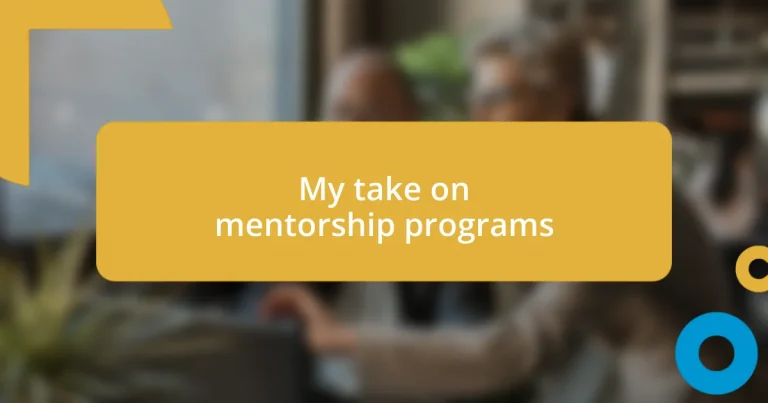Key takeaways:
- Mentorship programs are crucial for personal and professional growth, providing guidance, emotional support, and fostering a culture of learning.
- Both mentees and mentors benefit significantly; mentees gain confidence and skills, while mentors experience personal growth and fulfillment through the mentorship relationship.
- Effective mentorship relies on personalized guidance, open communication, and celebrating achievements, which helps in measuring the success of the program beyond traditional metrics.
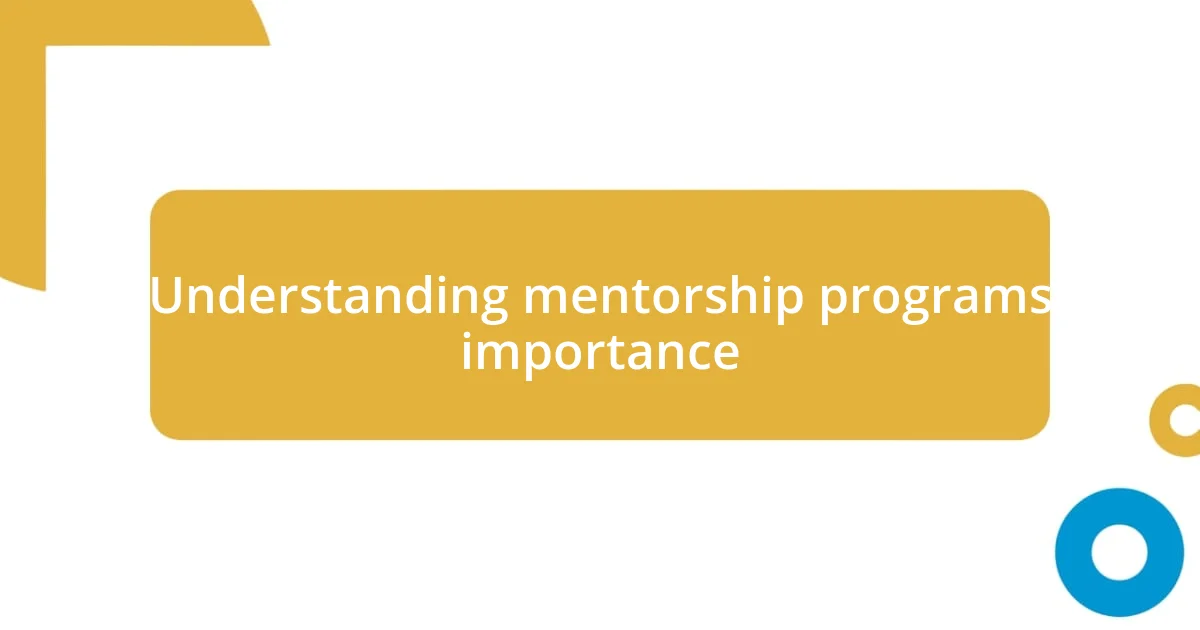
Understanding mentorship programs importance
Mentorship programs hold immense value, acting as a bridge between experience and aspiration. I remember when I was starting out in my career, feeling overwhelmed. It was a mentor’s guidance that illuminated my path, helping me navigate complex decisions and avoid common pitfalls. Isn’t it comforting to know there’s someone who has walked that road ahead of you?
The emotional impact of having a mentor cannot be overstated. It instills a sense of confidence and belonging, especially in high-pressure environments. When my mentor celebrated my small victories, it fueled my passion and drive—making me realize how transformative encouragement can be. Have you ever noticed how a few kind words can shift your entire perspective?
Importantly, mentorship programs foster a culture of learning and growth. They create a safe space for questions and exploration, which is invaluable in any professional journey. Reflecting on my experience, every question I posed to my mentor opened doors to new insights that I hadn’t considered. What insights could you unlock with the help of a mentor guiding you through your own challenges?
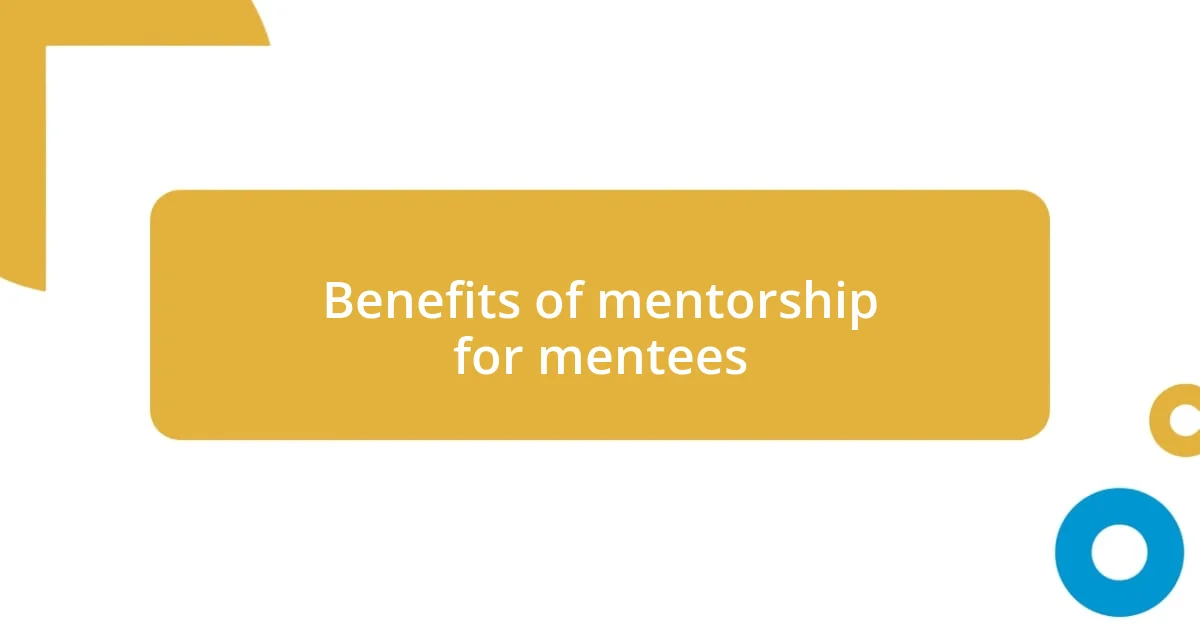
Benefits of mentorship for mentees
The benefits of mentorship for mentees are profound and multifaceted. Having a mentor means gaining access to a wealth of experience that enhances your learning curve. I remember a pivotal moment in my career when my mentor shared techniques for effective networking, which not only expanded my professional circles but also deepened my understanding of relationship-building. It was like having a cheat sheet to navigate a complex game.
Moreover, a mentor’s support can enhance your confidence, making you more willing to take risks. When I hesitated to pursue a challenging project, my mentor reminded me of my capabilities and encouraged me to step forward. This guidance transformed my outlook, ensuring I seized opportunities I might otherwise have shied away from.
- Personalized Guidance: Mentors tailor their advice based on their understanding of your ambitions and strengths.
- Enhanced Skill Development: Mentees often witness accelerated growth in both hard and soft skills through targeted advice and feedback.
- Networking Opportunities: Mentors often introduce mentees to valuable contacts, expanding their professional network.
- Increased Confidence: Regular encouragement from mentors helps mentees approach challenges with greater self-assurance.
- Emotional Support: Mentors provide a safe space for mentees to share concerns and celebrate achievements, reinforcing their sense of belonging.
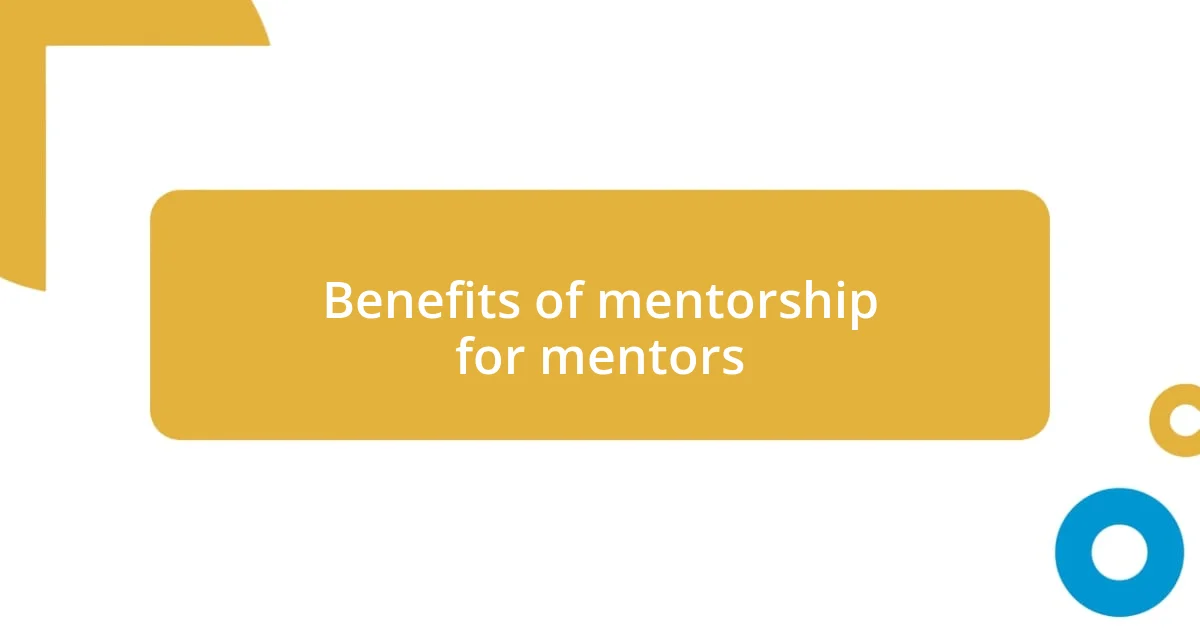
Benefits of mentorship for mentors
Mentoring is a two-way street, and for mentors, the experience is equally enriching. I recall how guiding someone through their own career challenges forced me to reflect on my journey. Each story shared with my mentee reminded me of the lessons I learned the hard way, reigniting my own enthusiasm for my profession. It’s fascinating how teaching reinforces knowledge, wouldn’t you agree?
Additionally, mentors often experience personal growth through this relationship. I’ve gained new perspectives on leadership that I might have brushed aside before. When I listened to my mentee’s fresh ideas, it opened my eyes to innovative approaches I hadn’t considered. Surrounding oneself with younger talent can inspire a renewed passion for one’s work, and every interaction carries the potential for learning.
Lastly, building a mentorship relationship cultivates a sense of community and fulfillment. Witnessing the progress and success of those I’ve mentored has brought me immense satisfaction. It’s a unique joy to know I played a part in shaping someone’s career path. Have you ever thought about how giving back can enrich your life as much as it does for those you guide?
| Benefit | Description |
|---|---|
| Personal Growth | Engaging with mentees often leads mentors to reflect on their own experiences, enhancing their self-awareness and skills. |
| Networking Opportunities | Mentors can expand their own professional circles through the connections and networks of their mentees. |
| Sense of Fulfillment | Watching mentees grow and succeed provides a deep sense of achievement and purpose. |
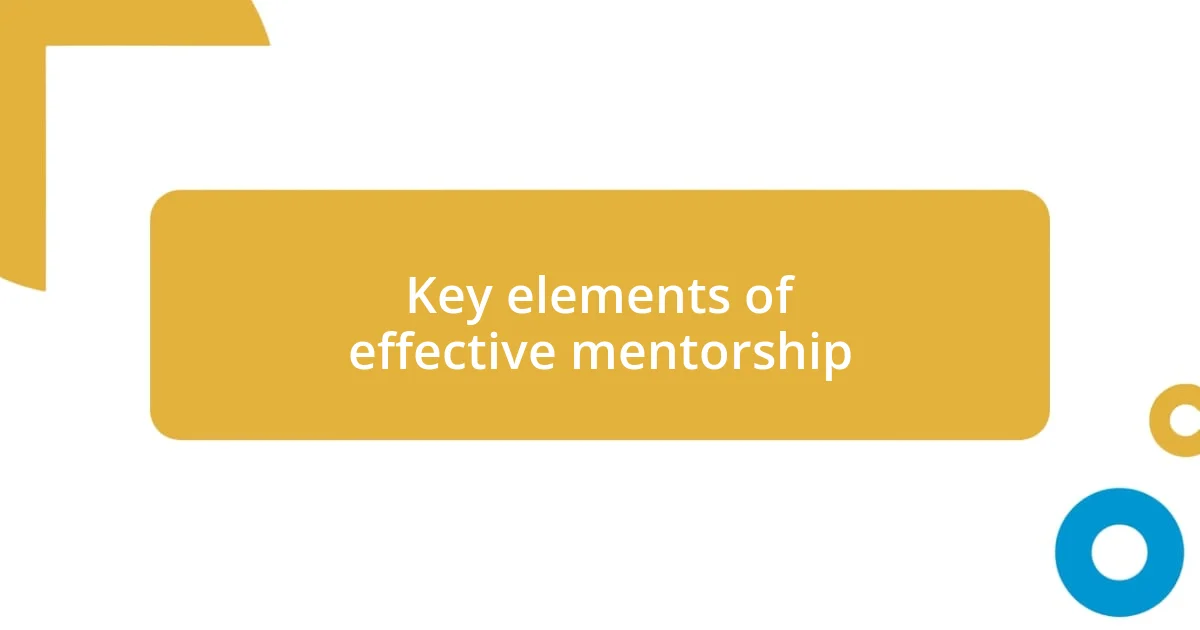
Key elements of effective mentorship
Effective mentorship hinges on several key elements that truly drive its success. One crucial factor is personalized guidance. From my experience, having a mentor who tailors their advice to my unique strengths and goals made a significant difference in my development. It felt less like generic feedback and more like a tailored suit – perfectly fitting for my journey.
Another critical component is emotional support. I recall times when I was overwhelmed with self-doubt, and just having my mentor listen really helped me navigate those feelings. It’s amazing how a simple acknowledgment of my struggles can embolden someone to push through tough times. Have you ever encountered someone who believed in you just when you needed it the most?
Lastly, the role of open communication cannot be overstated. I’ve found that honesty and transparency foster a safe environment where both parties can express their thoughts freely. This two-way dialogue not only builds trust but also enhances the overall learning experience. When my mentor encouraged me to ask questions, it transformed our conversations into rich discussions filled with insights. It’s a reminder that mentorship is as much about listening as it is about teaching.
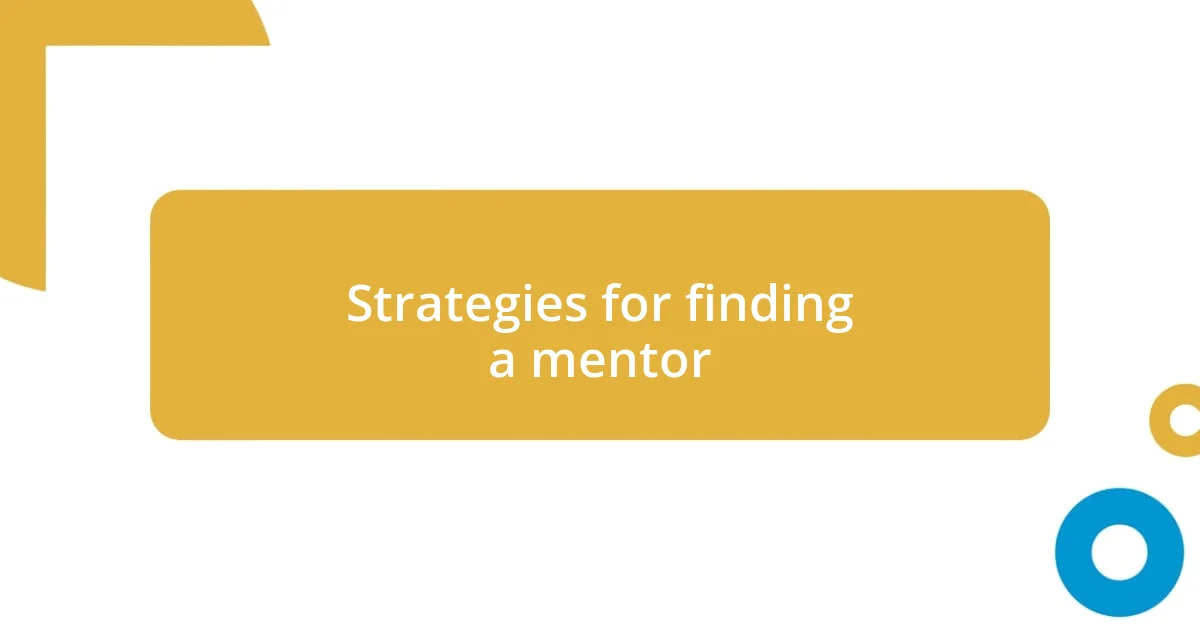
Strategies for finding a mentor
Finding a mentor can sometimes feel like searching for a needle in a haystack, but I’ve discovered some effective strategies along the way. One approach that worked for me was tapping into my existing network—colleagues, former professors, or even acquaintances in my field. I simply reached out to those I admired and expressed my desire for mentorship. It was surprising how open people were to that conversation. Have you ever just asked someone for guidance? You might be amazed by the connections you already have.
Another effective tactic is to engage in community activities or professional organizations related to your field. Volunteering or attending conferences can introduce you to potential mentors who share similar goals and values. I remember attending a networking event where I struck up a conversation with a seasoned professional. It turned into a mentorship relationship that lasted years. Interaction in these settings creates a natural opportunity for mentorship to blossom, don’t you think?
Lastly, don’t underestimate the power of social media platforms like LinkedIn. I’ve successfully reached out to industry leaders through thoughtful messages, highlighting my admiration for their work. Personalizing your outreach is key; a simple, genuine note can make all the difference. Have you considered using social media as a mentorship tool? It opens doors to connections that might otherwise be inaccessible.
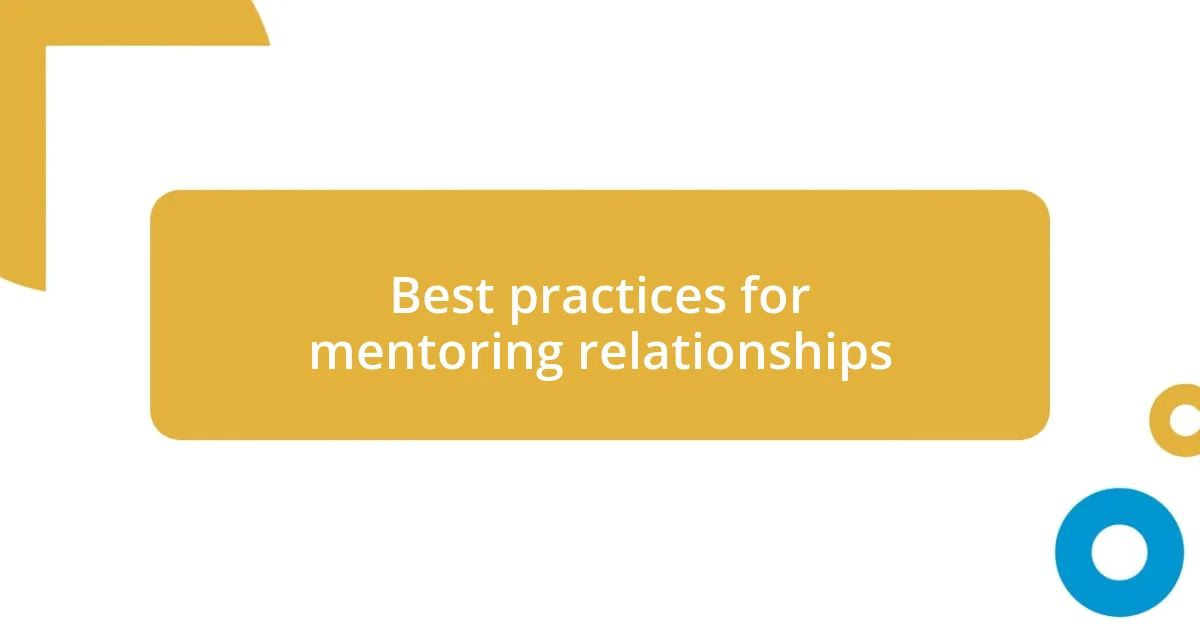
Best practices for mentoring relationships
Fostering a mentoring relationship requires a shared commitment to growth. From my experience, setting clear expectations right from the start was pivotal. I remember when I first began working with my mentor; we had an open discussion about our goals and what we hoped to achieve together. This foundational step created a roadmap for our relationship and ensured we were both on the same page. Have you ever experienced the clarity that comes from mutual understanding?
Another best practice involves regular check-ins. I’ve learned that consistent communication helps build momentum and keeps the mentoring relationship vibrant. In one instance, my mentor suggested we touch base every two weeks. Those catch-ups became a space where I could share achievements and challenges, which ultimately fueled my motivation. How often do you reflect on your progress with someone who inspires you?
Lastly, celebrating milestones is essential. I recall a time when I completed a significant project, and my mentor organized a small celebration to recognize my hard work. This gesture wasn’t just about marking an achievement; it deepened our bond and made me feel valued. Recognizing these moments together can create lasting memories and reinforce the journey of growth. What achievements would you want to celebrate with a mentor?
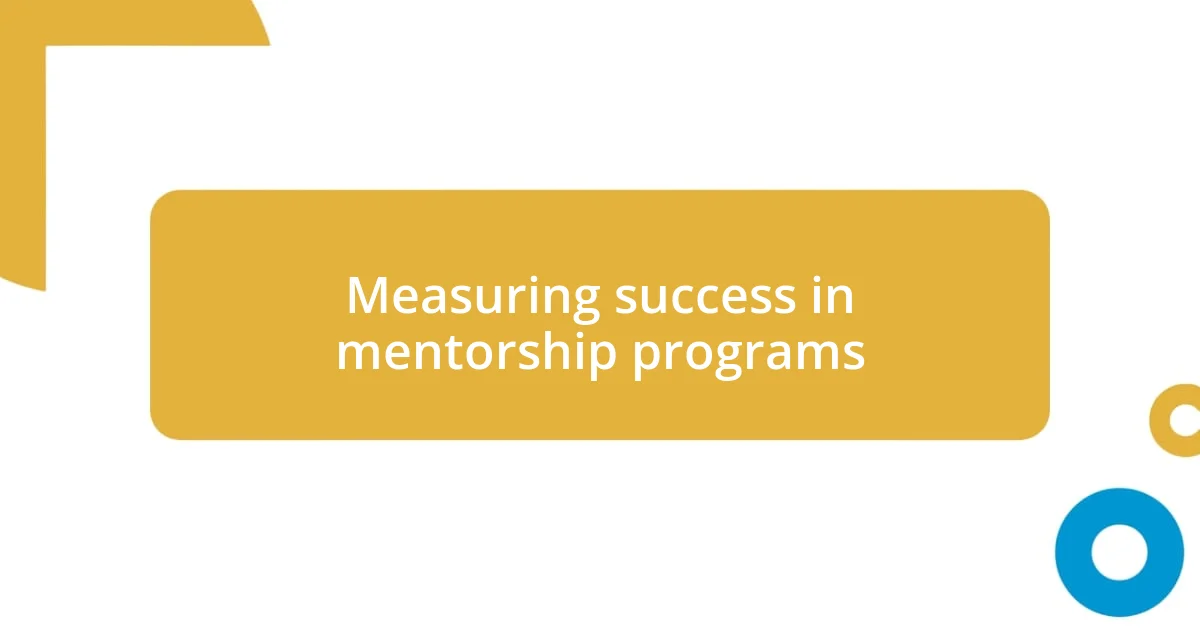
Measuring success in mentorship programs
When it comes to measuring success in mentorship programs, I believe it’s essential to look beyond traditional metrics. For instance, personal growth is a powerful indicator. I recall one mentee who, after months of collaboration, found the confidence to lead a project presentation—a transformative moment! Have you ever witnessed someone blossom right before your eyes? It’s a feeling that underscores the true impact of mentorship.
Another dimension to consider is the quality of the relationship itself. I once had a mentor whose availability and willingness to listen made all the difference in my experience. By regularly soliciting feedback from both mentors and mentees about their feelings on the partnership’s effectiveness, programs can gauge the health of these connections. How often do we reflect on our relationships and their value?
Lastly, I find it valuable to assess the outcomes of specific goals set at the program’s outset. Tracking progress toward these objectives can provide concrete evidence of success. For example, in a recent mentoring initiative, the focus was on skill development. At the end of the program, we surveyed participants, and the responses highlighted not just skills acquired but increased job satisfaction as well. Isn’t it amazing how mentorship goes hand-in-hand with professional fulfillment?












